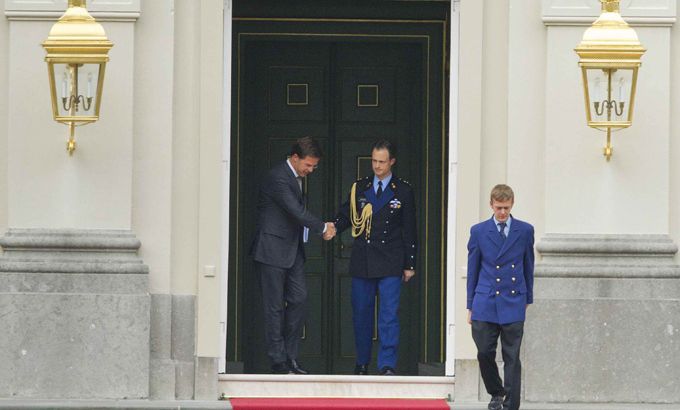Dutch PM resigns after failed austerity talks
The Netherlands’ Queen Beatrix has reportedly accepted Mark Rutte and his cabinet’s resignation.

Mark Rutte, Dutch prime minister, and his cabinet have offered their resignation to Queen Beatrix after the collapse of a parliamentary partnership with a far-right party.
The Dutch government information service confirmed on Monday that Rutte had met Queen Beatrix and she had accepted his resignation, asking him to tend to pressing matters of state with a caretaker government for the time being.
The resignation has been widely expected since the weekend when Rutte acknowledged that his government’s rift with anti-Islam politician Geert Wilders’ Freedom Party would likely lead to early elections, otherwise due in May 2015.
“Legally, new elections can’t happen before September… but the prime minister will continue on a caretaker until then,” Al Jazeera’s Jonah Hull reported from the Hague.
“He will have to be open to work with opposition politicians in order to pass some sort of an austerity budget.”
Wilders row
Although not part of the ruling coalition, Wilders’ party had effectively guaranteed the government’s majority for the last 18 months by agreeing to support it in parliament.
That arrangement came to an abrupt halt at the weekend when talks about a new package of austerity measures foundered and Wilders walked out.
“We don’t want our pensioners to suffer for the sake of the dictators in Brussels,” Wilders was quoted as saying.
European Commissioner Neelie Kroes called Wilders a hypocrite, since the Netherlands itself, along with Germany, had been one of the loudest in demanding Brussels adopt 3 per cent deficit limit in the first place.
“Pointing to Brussels now is dumb, it’s untrue, it’s distracting, and it doesn’t solve anything,” said Kroes, who is a member of Rutte’s free-market VVD party.
Eurozone crisis
The talks at the centre of the row aimed at cutting $21bn (16bn euros) off the budget, which sat at 4.7 per cent of gross domestic product for 2011, and hoped to steer Europe’s fifth-largest economy back within EU deficit targets.
“This has a real impact on the eurozone crisis as a whole. The european markets have been reacting very badly during the course of the day, not just from events in the Netherlands but also from events in France over the weekend,” Al Jazeera’s Hull said.
“All of this [is happening] in a time that what is really needed is confidence for countries to be pulled out of crisis.
“They are all pushing things towards one conclusion – which is that the eurozone crisis is once again back indeed.”
Our correspondent also said that the move could put the country at a higher risk of losing its coveted AAA credit rating.